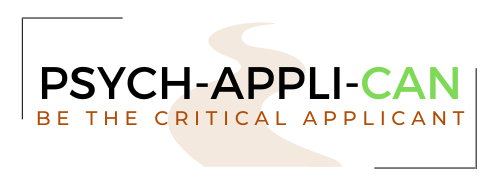When we spoke to aspiring clinical psychologists who were actively going through the application process, they highlighted the emotional challenges that can come with applying for the course. They advised that having some well-being tips to hand throughout the process, could be helpful in reducing some of the anxiety and stress. We reflected upon our own journey’s, the stories that were shared with us and identified some strategies that we found helpful throughout the process. We have listed some of these below and have created downloadable infographic’s that you could save, share or print, which include these tips to use as handy prompts. These are just a starting point to help you to begin to think about ways in which to look after yourself throughout the selections process. You know yourself best and will know what works well for you!

We have created an infographic that you can download, share and print containing the below information which you can download here.
 Focus on what else in your life is important, aside from your DClin application. Make sure to put time aside for self-care, hobbies and your social life, so that you are not consumed with the application process. This will help to prevent burnout and protect your mental health.
Focus on what else in your life is important, aside from your DClin application. Make sure to put time aside for self-care, hobbies and your social life, so that you are not consumed with the application process. This will help to prevent burnout and protect your mental health.

Take breaks when you need and don’t be hard on yourself for doing so! Breaks are just as important as the work you are doing!

If you are feeling anxious using some breathing techniques could be helpful. This could help to release the tension and ground you within the moment.
 Throughout the application process it is natural to experience worries. Using skills to manage worries such as writing your worries down, taking to someone or focusing upon what you can control rather than the things that you can’t can be helpful.
Throughout the application process it is natural to experience worries. Using skills to manage worries such as writing your worries down, taking to someone or focusing upon what you can control rather than the things that you can’t can be helpful.

Set up a nice environment for when you write your application/prepare for interviews. If you can work somewhere that feels tidy and clean, this may help you prepare with a clear mind. You could also surround yourself with things that make you feel calm or happy.
 Allow yourself time to acknowledge and feel the emotions you are experiencing. Burying your feelings can make them feel more overwhelming.
Allow yourself time to acknowledge and feel the emotions you are experiencing. Burying your feelings can make them feel more overwhelming.
 We have created an infographic that you can download, share and print containing the below information which you can download here.
We have created an infographic that you can download, share and print containing the below information which you can download here.
 If being a part of social media groups becomes overwhelming, you may want to mute notifications from the group.
If being a part of social media groups becomes overwhelming, you may want to mute notifications from the group.
 Avoid getting feedback on your application from too many different people, feedback may be inconsistent and cause further stress.
Avoid getting feedback on your application from too many different people, feedback may be inconsistent and cause further stress.

During the application/interview process, factor in time for you to engage in some self-care activities. For example, going for a walk, watching TV or spending time on hobbies.
 Try to refrain from listening to the horror stories about how many times it took people to get onto the course; while some people apply many times, there are plenty of others who are offered a place within the first couple of applications!
Try to refrain from listening to the horror stories about how many times it took people to get onto the course; while some people apply many times, there are plenty of others who are offered a place within the first couple of applications!
 The selections phase is also an opportunity for you to assess each course and determine whether they are right for you. It’s better to be a part of a course that matches your values and feels right.
The selections phase is also an opportunity for you to assess each course and determine whether they are right for you. It’s better to be a part of a course that matches your values and feels right.
 Acknowledge that other people may not understand the stress and the process you are going through. The DClin application is not a typical job application! Explaining the process to them, in a way which feels comfortable, can help them to understand and support you through it.
Acknowledge that other people may not understand the stress and the process you are going through. The DClin application is not a typical job application! Explaining the process to them, in a way which feels comfortable, can help them to understand and support you through it.

We have created an infographic that you can download, share and print containing the below information which you can download here.

Before an interview, it may be useful to write down three things you are grateful for and remind yourself of these once the interview has finished.
 Plan to do something nice afterwards, even if things don’t go as planned make sure that you go.
Plan to do something nice afterwards, even if things don’t go as planned make sure that you go.
 Think about meaningful quotes or phrases which you can use throughout the selections process. This could be something you’ve seen that you found motivational, or you could make up your own!
Think about meaningful quotes or phrases which you can use throughout the selections process. This could be something you’ve seen that you found motivational, or you could make up your own!
 Try not to over-prepare for interviews. It can be really easy to lose yourself and what is important to you when you are focusing upon remembering all of the information you have read and trying to get things “right.”
Try not to over-prepare for interviews. It can be really easy to lose yourself and what is important to you when you are focusing upon remembering all of the information you have read and trying to get things “right.”
 If you do get bad news, allow yourself time to be upset. It’s natural and healthy to feel and express your emotions. People find it helpful to do this in a variety of ways, such as setting aside some alone time, journaling, listening to music or speaking about these emotions to family and friends.
If you do get bad news, allow yourself time to be upset. It’s natural and healthy to feel and express your emotions. People find it helpful to do this in a variety of ways, such as setting aside some alone time, journaling, listening to music or speaking about these emotions to family and friends.
 Remind yourself that any feedback you get is someone’s subjective opinion. Try to consider feedback in context and ask others’ opinions if you find that a specific piece of feedback is getting you down.
Remind yourself that any feedback you get is someone’s subjective opinion. Try to consider feedback in context and ask others’ opinions if you find that a specific piece of feedback is getting you down.
